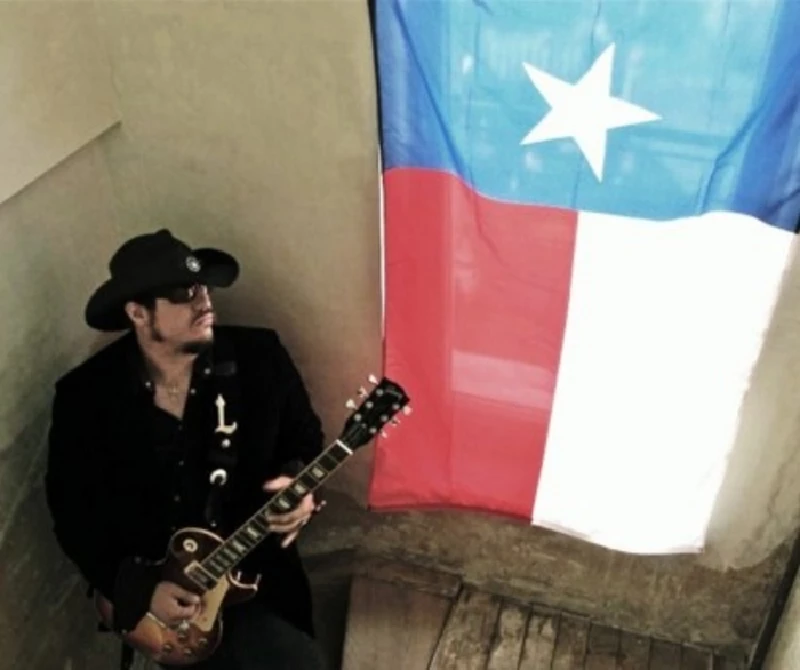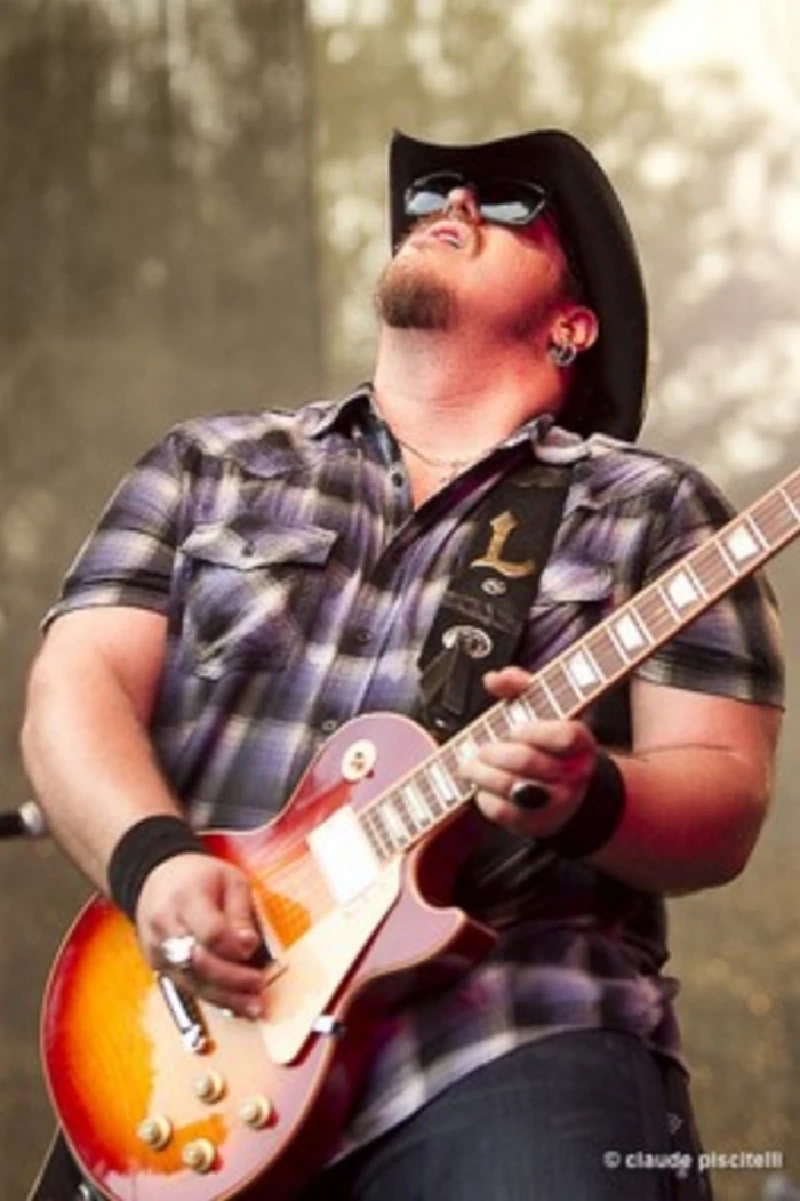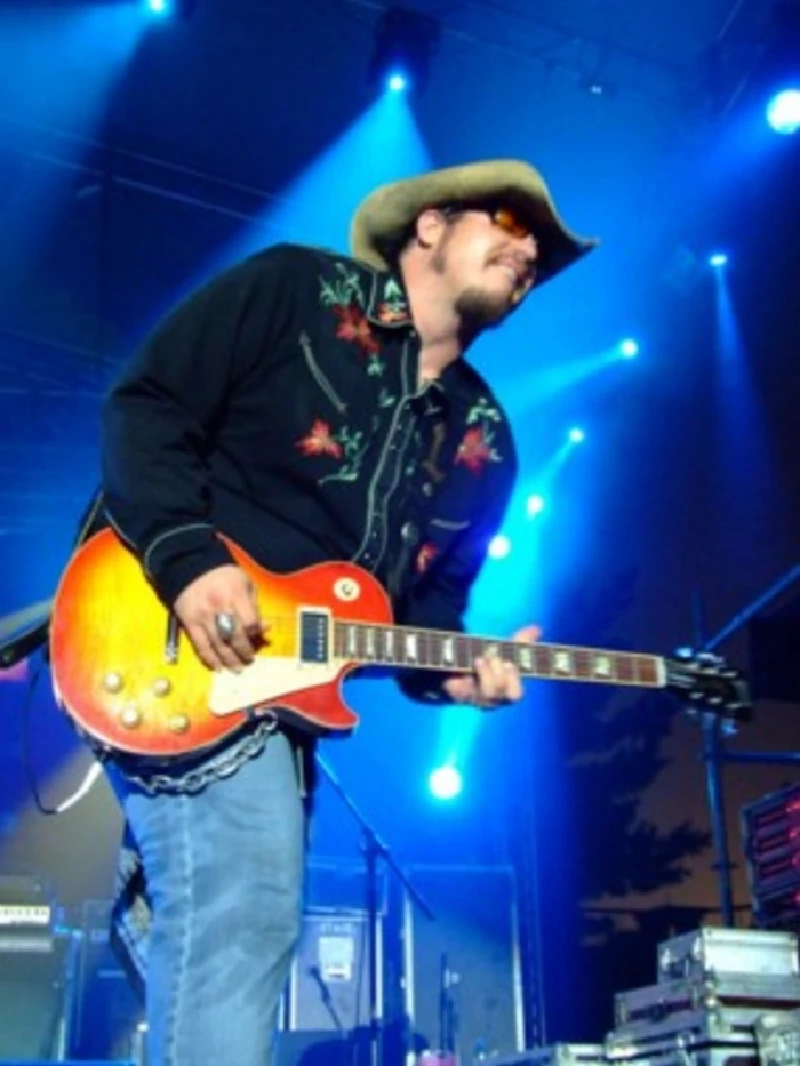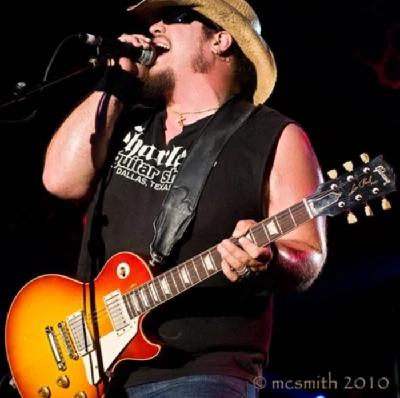Lance Lopez - Interview Part 1
by Lisa Torem
published: 4 / 12 / 2010

intro
In the first part of a two part interview with Lisa torem, Texan blues guitarist Lance Lopez talks about the influence of Jimi Hendrix on his music and his teenage years spent playing gigs in bars
Guitarist, singer-songwriter Lance Lopez recently stole the show for the third time at B.B. King’s in New York City. “Any chance I get to pay homage to Jimi Hendrix I do. He shaped my attitude towards the electric guitar and his music will always inspire me,” Lopez says, about the late guitarist and his central influence. Born in Shreveport, Louisiana, the budding guitarist relocated to Dallas, Texas at the age of twelve. Though, as a young boy he had also lived in New Orleans and Florida, his musical roots solidly took shape there. At 17 Johnnie Taylor asked Lopez to support him on tour for half of a year. The next year he became the bona fide band leader to Lucky Peterson’s band; their international partnership led to a three year commitment. ‘First Things First’ was the exciting debut produced by Jay Newland (Norah Jones) in 1998. By that time, Lopez had played guitar for the Buddy Miles Express. The new millennium found Lopez back in the studio releasing three studio albums and one live CD; all recordings branded with the passion evidenced in hero Hendrix. Lopez’s recent major label tour de force at MIG, ‘Salvation From Sundown’, features stealthy songwriting and crackling fierce, blues-based fretwork. His signature scratchy, lived-in vocals add another amazing layer of texture. Lopez explains what drove him to become a guitarist who has been compared favourably to guitar greats like Stevie Ray Vaughan and Jimi Hendrix. PB: Hi Lance. It appears that your family moved around a lot when you were younger, back and forth between Louisiana and Texas. How did these moves affect you artistically and socially? LL: Well that’s a very good question. The economy was very bad down south in the late 1980's so my mother moved to Dallas, Texas from Shreveport, Louisiana, where I was born and lived until I was twelve, because there were jobs there. When I was twelve I moved over to Dallas with my mother for two years. When I was fourteen I moved to New Orleans. My Dad lived in New Orleans, Louisiana and then Port Charlotte, Florida. I lived with him both places, until eventually we moved back to Texas in 1994 and I've been here ever since. My parents split up when I was five. I lived back and forth between both of them, and sometimes, even with my older sister. I was always on the road, even then (Laughs. I was always the new kid and the “lone wolf” with the guitar. My guitar always helped me to make friends and still does today (Laughs). I would delve into whatever music, wherever we lived. My dad was very supportive of my music so when I lived with him he took me to all the bars and to get gigs and jam with all the older musicians...I learned so much musically from all the different regions I lived in...It was great. PB: How did you learn to play the guitar? LL: I was 100% self- taught at first. I went into a pawn shop with my father when I was five years old and in that shop was a real 1957 Sunburst Fender Stratocaster. I'll never forget it and the guy only wanted $300 for it and it seemed like so much money at the time. Well, my dad was buying a violin for my mother and he went to do the deal with the guy and I asked him if I could play the guitar while they talked. My dad was so excited that I wanted to take it down and play it...from that point on I was obsessed with guitars. I already was a big music fan because my dad had turned onto Elvis pretty much at birth (Laughs). My dad bought my first guitar for me as a Christmas gift when I turned eight years old. I received it at the house I grew up in Louisiana and it was a magical moment in my life. I locked myself in the bedroom with it and a Mel Bay Chord book and tried to learn everything I could. I then began going to concerts with my older brother, cousin and friends. This was back in the 80s so I saw bands like AC/DC, KISS, Van Halen, Metallica, Whitesnake, Motley Crue...all those bands like that...and I would get there early so I could get in the front row and watch everything those guitarists did. I studied their every move. Then later as I began to play in bands, and with other guitarists and musicians, I would always learn more and more...I’m still learning something new all the time. Two big things happened back in my early days of playing guitar: One was first hearing Jimi Hendrix when I was ten years old and the second was seeing Stevie Ray Vaughan play his last hometown show with B.B. King in Dallas in 1990. Those things kind of set the course for my guitar playing after that. PB: At fourteen, you played the clubs in New Orleans. Were you impressionable? Do you have any regrets about being thrown into the adult world so soon? LL: Wow...Oh yeah, I mean I don't regret anything. All my experiences made me who I am today. I just wished I would have made some better choices when I was young like that. New Orleans is a party town and that’s what I learned to do besides play music was to party while doing so (Laughs). It’s just that a dependency soon followed and that was the consequence of bad choices. I would drink with the old school blues guys and learned to step out the back door and smoke a joint in between sets and then later the small packets of cocaine and heroin would be handed to me in the bathroom for a snort. I believed that myth that it would make me play better and that if I "really wanted to play the blues" I had to live hard. It escalated very quickly and I was hiding from my dad when he would take me out to my gigs. He knew what I was doing, but he just let me go my own path. He knew eventually I would learn my lesson (Laughs) and I did...But it took awhile (Laughs) I'm sober today and I'm very grateful for that. as I am grateful for all my experiences early on because they made me who I am. PB: At seventeen, you were asked by Johnnie Taylor to tour. At eighteen, you toured with Lucky Peterson, Little Richard, Jimmie Vaughan, Junior Wells and others. Did you pick up any advice or licks from these legends? LL: When I was sixteen I got caught smoking pot in high school so they threw me out. I was in the jazz band in school and the band teacher really had a special interest in me because he thought I was very talented so he wrote letters to Berklee School of Music in Boston. He wanted me to take my G.E.D and go to Berklee early. I thought about it hard and then my dad came to me and said we were moving to Texas. I was excited because all my friends were there. I decided to blow off Berklee and move back to Dallas and when I got there I hooked up with Billy F. Gibbons from ZZ Top who became a mentor to me almost instantly, and then I began jamming at places like the Greenville Bar and Grill and the Bone. Johnnie Taylor's guitar player saw me sitting in with Lucky Peterson at a club in South Dallas called Booker's Arandis and asked me to sub for him in Johnnie Taylor's band and that lasted six months (Laughs) That’s when real life started (Laughs). I played all over the Chitlin' Circuit with Johnnie and them. A lot of the same people were still there from when Jimi Hendrix was backing everybody on the Chitlin' Circuit and they felt the same way about me as they did about Jimi - "what's this little, long- haired fool doin' here?" (Laughs). I learned so much there, especially about singing and Black Gospel Music and R&B. It was the best music school I could've ever gone to. I loved playing with horn bands. I had done that in high school with the jazz band, but now this was the real deal. I learned to transpose horn licks into guitar licks and stuff like that...it was great. Most of the time I was the only white guy in the band, or in the building, for that matter. At some shows they would have a black Sheriff Deputy walk me onto the stage and stand there and watch me play because I was underage and because I was the only white person in the place. They were worried about my safety; or sometimes I would have to sit out on the bus until it was time to go on and Big Joe, the sax player, (who was a real big guy) would walk me onto the stage. But it was cool. Once they heard me play I was accepted instantly and it was great and we partied all night. I was really fearless I used to go into all kinds of ghettos and just find the blues clubs and soul food places and go in and eat and sit in and play. Everyone would look at me crazy because I would be sitting there eating pigs feet and collard greens and then I would get up and play some B.B. King or Albert King licks and they would trip out (Laughs) One of my fondest memories was meeting Johnny Guitar Watson in Little Rock, Arkansas, the year before he died, and he told me "Keep yo mind light, yo women tight and yo money right" (Laughs). PB: A few years later, you became Lucky Peterson’s band leader. What were your responsibilities? LL: Lucky is one of the greatest musicians I ever stood onstage with. He's amazing...truly amazing and I learned so much, if not the most, musically from Lucky. We had quite some wild times together. We were big “using” buddies, so there was a lot of cocaine involved in our relationship and that made everything very weird as it always does. But musically it was amazing. Lucky was the first person to bring me to Europe and he really went out of his way to make sure the European audiences were made aware of my guitar abilities. He really pushed me out front and gave me a lot of solos; I think it made some of the other band members jealous. Then he made me musical director and that really threw everyone over the edge, as far as the other band members' jealousy. I would make our set list and pick out the material we played and guitar tech for Lucky and make sure all of our gear was cool. Lucky also required that I play every instrument in the band (aside from the horns) so that I would be able to take a band member's instrument from him and show him his part if he was unable to learn it correctly. But it was out of control back then. We would party for days on end on the road and when we got home, the party continued. We would come in off the road (Lucky's house was the meeting point for all the band members) and we would tell everyone we had business to discuss or we had to work to do, and then we would wait until the last person left and then go on a three to five day binge. It began to wear on me and I had to step away...I jumped from the frying pan and into the fire because when I stopped working with Lucky, I began working with Buddy Miles and it was ten times worse (Laughs) But being out on the road with Lucky is when I met Little Richard, Junior Wells, Buddy Guy, Jimmie Vaughan, Larry Graham, and all those guys. There again I learned so much. I've heard Lucky is doing much better today and that makes me very happy. PB: At the end of the 90s, your debut album, 'First Things First', was released. Did you feel a sense of urgency, at that point, to get all of your musical ideas down? For some artists, that first album is the most confessional. LL: Well at the time I did that disc I was working with Buddy Miles and everyday was a nonstop party. My dad and his wife, at the time, had won some money over at the casino in Louisiana and Buddy talked him into using some of it to fund my first disc and he wanted to produce it. So I put together a little trio and we took up a Wednesday Night residency at Blue Cat Blues, which was the hottest Blues club in Dallas during the 1990's. Buddy was living over in Fort Worth and we used to also jam at J & J's Blues Bar over there quite a bit and Buddy would sit in with us. Buddy had a huge house over in Fort Worth - someone just gave him and let him live there. We had many late night parties and jam sessions there especially after jamming at J & J's. A lot of the material for my first disc came out of those jam sessions at Buddy's house or just me and Bud sitting around jamming. Buddy was a great bass player and we used to just have a Fender Twin Reverb Amp in the living room or the bedroom and I would plug in my Strat to one side and Buddy would take a Fender Bass and flip it upside down and plug it into the other side and play upside down bass. We would write riff after riff; actually ‘Romeo’ from ‘Salvation from Sundown’ came from one of these jams. So when we had enough material together we went into the Dallas Sound Lab in Las Colinas where Stevie Ray Vaughan had recorded and started cutting tracks. And just like when SRV recorded there, it became a huge party in the sessions. Buddy had tons of hangers on in the studio and there was tons of drugs and I couldn't get anything done. It was a struggle to get a basic track cut. And while we were tracking, Buddy would scream at us “NO, NO, NO, IT'S ALL WRONG" and they would be perfect takes (Laughs). So we were recording hundreds of takes. It was very difficult to say the least (Laughs). I finally snapped and threw everybody out of the studio and fired Buddy right then and there. We had an epic falling out at that time. We put the project on hold until I could get it together enough to finish it six months later with blues and jazz engineer Jay Newland, who later went on to work with Norah Jones. Making that disc was very difficult so by the time it was finished I felt like I was just gasping for breath to get to the finish line (Laughs). PB: In 2003, you recorded 'Wall of Soul' under a new label, Grooveyard Records. Did this change influence your writing? LL: There were two or three years in between '1st Things First' and 'Wall of Soul'. I had toured Europe quite extensively in 2000 and 2001 in support of the first disc. During that tour I began writing a lot of the material for 'Soul' and I had a lot of material that was left over from the previous sessions that Buddy didn't allow me to put on '1st Things'. When I came home from Europe I got married and had a couple of kids and when that was going on Grooveyard approached me about recording for them. I said “okay” because I had a lot of material to record. But then it was like "...we don't want any ballads or blues or anything like that. We want Robin Trower, Frank Marino, and Hendrix only!" So that was kind of weird, but I agreed, because that was some of my favourite stuff. I brought in my close friend I've known for many years, Eric Gales, to help me produce 'Soul' because it was the first disc I had ever produced on my own. I wasn't partying at the time but Eric was, so we ran into a couple of stumbling blocks, but nothing like the last disc. I told Eric what Grooveyard wanted and we thought it would be fun because we were both big into Trower and Marino. I was a huge Robin Trower fan, especially during the time of Grunge and Nirvana and all that in the early 90's. The kids I went to school with that played guitar were at home learning how to play ‘Smells Like Teen Spirit’ and I was at home with ‘Bridge of Sighs’ ‘Long Misty Days’ and ‘For Earth Below’. So it was exciting. I even covered ‘Shame the Devil’ from ‘For Earth Below’. We returned to the Dallas Sound Lab to record basic tracks with engineer Don Moore who also has a ranch house converted into a studio in Wylie, Texas called Sound Crafter. We finished the disc at Sound Crafter and Don was a big help. He's a really good guy and we still have a great relationship today. I have used him on tons of other projects. I was, however, unhappy with the drum sounds because Eric Gales wanted to put them into a dead isolation booth and add reverb effects later and Don backed him on it. I wanted the drums in a big room so they can breathe. Other than that, I was happy that we were able to get what we got with only a couple of thousand bucks, which is nothing to record a disc. One of the major highlights on the disc was bringing in Doug Pinnick from King's X to sing on the track ‘Time.’ Doug's great and once he heard that me and Eric were recording up in Dallas he came straight up from Houston and sang on the track; it was great! But there again I had a lot of material that never made it on the disc. Also, with the lack of funds it was very rushed and I always hear that, whenever I listen to tracks from ‘Soul’. I get tons of emails all the time from young guitarists and they always tell me how influential ‘Wall of Soul’ is to them and that to me means mission accomplished. That more than anything is the goal in making a great disc, the fact that it influences the younger musicians.
Picture Gallery:-


interviews |
|
Interview Part 2 (2010) |

|
| ...while in the second part he talks about touring with Joe Bonemassa and Buddy Miles and his latest album, 'Salvation From Sundown' |
most viewed articles
current edition
Peter Doherty - Blackheath Halls, Blackheath and Palace Halls, Watford, 18/3/2025 and 21/3/2025Armory Show - Interview with Richard Jobson
Liz Mitchell - Interview
Lauren Mayberry - Photoscapes
Deb Googe and Cara Tivey - Interview
Max Bianco and the BlueHearts - Troubadour, London, 29/3/2025
Garfunkel and Garfunkel Jr. - Interview
Maarten Schiethart - Vinyl Stories
Clive Langer - Interview
Sukie Smith - Interview
previous editions
Heavenly - P.U.N.K. Girl EPBoomtown Rats - Ten Songs That Made Me Love....
Trudie Myerscough-Harris - Interview
Doris Brendel - Interview
Beautiful South - Ten Songs That Made Me Love...
Dwina Gibb - Interview
Kay Russell - Interview with Kay Russell
Pulp - Ten Songs That Made Me Love...
Barrie Barlow - Interview
Sound - Interview with Bi Marshall Part 1
most viewed reviews
current edition
Davey Woodward - Mumbo in the JumboNigel Stonier - Wolf Notes
Wings - Venus and Mars
Kate Daisy Grant and Nick Pynn - Songs For The Trees
Only Child - Holy Ghosts
Neil Campbell - The Turnaround
Philip Jeays - Victoria
Darkness - Dreams On Toast
Suzanne Vega - Flying With Angels
Charles Ellsworth - Cosmic Cannon Fodder
Pennyblackmusic Regular Contributors
Adrian Janes
Amanda J. Window
Andrew Twambley
Anthony Dhanendran
Benjamin Howarth
Cila Warncke
Daniel Cressey
Darren Aston
Dastardly
Dave Goodwin
Denzil Watson
Dominic B. Simpson
Eoghan Lyng
Fiona Hutchings
Harry Sherriff
Helen Tipping
Jamie Rowland
John Clarkson
Julie Cruickshank
Kimberly Bright
Lisa Torem
Maarten Schiethart